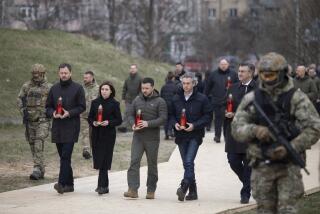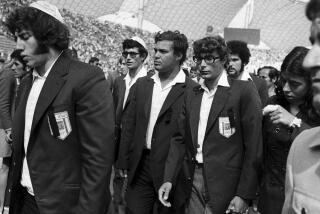U.N. closes Iraq weapons inspection program
UNITED NATIONS — The Security Council on Friday shut down the weapons inspection program that was at the heart of the U.N.’s effort to find weapons of mass destruction in Iraq.
The team of inspectors, known as the U.N. Monitoring, Verification and Inspection Commission, did not find the weapons that the U.S. and Britain said had been stockpiled by Iraqi President Saddam Hussein. The two nations’ insistence that such weapons posed an imminent danger was the basis of the U.S.-led invasion of Iraq in 2003.
The U.S. barred the team from returning to Iraq after the invasion and informed the Security Council in May 2003 that it and Britain would take over disarmament duties.
But the inspectors have continued their work at the United Nations, using satellite images to pinpoint remnants of chemical and biological weapons programs from the 1990s that could be used by insurgents. The team also cataloged the information it had accumulated in years of scouring Iraq for arms.
But on Friday, 14 of the council’s 15 members declared that the inspection team’s job was done and its work no longer relevant.
Russia abstained, saying it was up to the U.N. to declare that Iraq had been disarmed, not the U.S. or Iraq.
The United States and Iraq have pushed since 2005 for the abolition of the inspection team, which has been funded by Iraqi oil revenue held in trust. The team’s budget is about $10 million a year, and it has reserves of about $63 million, which will be returned to Iraq.
U.S. Ambassador Zalmay Khalilzad was asked whether he would credit the team for its work and for having what turned out to be better intelligence about Hussein’s weapons capabilities than did the U.S. and Britain.
“That is something that historians will have to work with,” Khalilzad said.
But he said the team should be recognized for helping destroy “a substantial amount of Iraqi WMD capabilities” after the Persian Gulf War in 1991.
The inspectors, who had argued that their expertise could be put to use in a permanent U.N. department for monitoring and verification around the world, now must figure out what to do with 1 million megabytes of data and classified formulas for chemical weapons, not to mention a Scud missile engine occupying a cubicle in the office.
The commission Thursday published a 1,200-page account of Iraq’s weapons programs and the lessons learned in the verification process.
The team was the latest generation of an inspection process created after the 1991 war to ensure that Iraq dismantled its weapons systems.
In the 1990s, U.N. inspectors uncovered Iraq’s secret chemical and biological weapons programs and production of long-range ballistic missile engines. The U.N. dismantled and destroyed much of the material, including the nerve agent VX.
Nuclear inspectors from the U.N.’s International Atomic Energy Agency helped reveal the extent of Iraq’s covert nuclear program, which never succeeded in producing a working weapon, despite U.S. intelligence reports and White House assertions that claimed it had the capability.
The head of inspection commission, Demetrius Perricos, told the Security Council Friday that there was still “a residue of uncertainty” whether Iraq had been fully disarmed. He said insurgents in Iraq still might try to acquire toxic agents to make weapons, citing the use of chlorine bombs made with scavenged materials. He also warned that there still are people in Iraq with weapons-making know-how, blueprints and “cookbooks” who should be monitored.
Perricos made his remarks on his last day on the job after decades at the U.N., and thanked the inspectors who tried to maintain objectivity in the middle of a politically charged atmosphere in the months before the Iraq invasion.
“They made Iraq a success story in international verification by their professionalism, and I hope that this expertise will not be dispersed and lost for the U.N. in the future,” he said.
More to Read
Sign up for Essential California
The most important California stories and recommendations in your inbox every morning.
You may occasionally receive promotional content from the Los Angeles Times.










